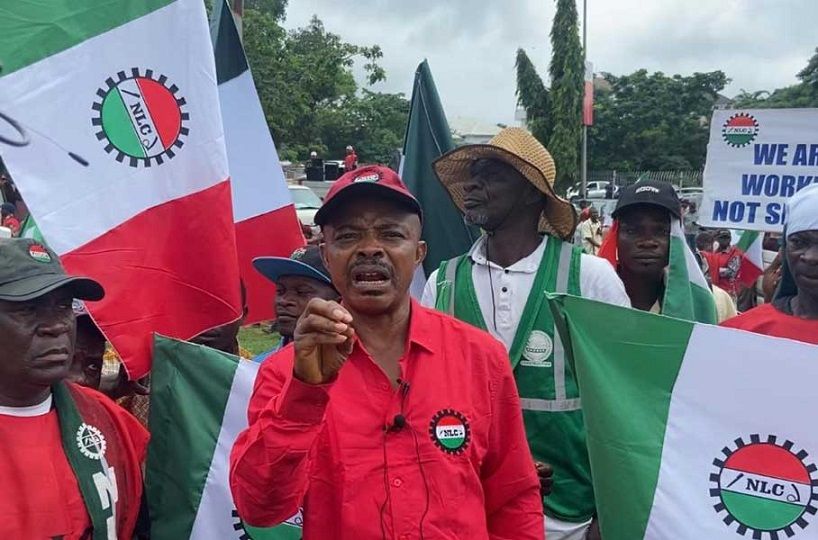The Nigeria Labour Congress (NLC) has accused the International Monetary Fund (IMF) and the World Bank of being the driving forces behind Nigeria’s economic difficulties, slamming the IMF for distancing itself from the Nigerian government’s decision to remove petroleum subsidies.
In a statement titled, “Nigeria’s Economic Mess and IMF’s Denial: Esau’s Hands but Jacob’s Voice,” NLC President Comrade Joe Ajaero condemned the IMF and the World Bank for what he termed a history of harmful economic policies imposed on developing nations like Nigeria.
He argued that these institutions consistently push for austerity measures, including subsidy removal, which, he claimed, have deepened hardship for Nigerians.
“The NLC believes that it is cynical and indeed typical of the IMF to recently deny responsibility for the Nigerian government’s removal of petroleum subsidy,” Ajaero said.
“The IMF and its economic mischief cousin, the World Bank, are the twin forces that have a longstanding pattern of recommending harsh and unworkable economic policies to developing nations.”
At the recent IMF and World Bank Annual Meetings in Washington D.C., IMF’s African Region Director, Abebe Selassie, asserted that Nigeria’s fuel subsidy removal was a “domestic decision.”
However, Ajaero refuted this claim, insisting that IMF policy dialogues heavily influence Nigeria’s economic direction and often prescribe subsidy cuts as essential for fiscal sustainability.
“IMF’s recent statement is a display of subterfuge and evasion,” Ajaero said, accusing the IMF of attempting to evade responsibility for the suffering caused by its recommended policies.
He added that the IMF’s denial disregards the significant influence it exerts on the economic policies of developing countries.
The NLC pointed to a growing disconnect between the IMF’s economic prescriptions and the daily realities faced by Nigerians.
According to Ajaero, the IMF and the World Bank often suggest “expanded social protections” to mitigate the social cost of subsidy removals, but he criticized these protections as inadequate.
“Subsidy removal and price hikes have pushed essential goods beyond the reach of many, with government-provided social safety nets remaining woefully inadequate,” he stated.
The labour leader warned that IMF-driven policies had led to a cycle of poverty and dependency, as many Nigerians are forced to rely on government handouts.
He described the IMF’s stance on social protection as a “system that beggars the people,” which he argued does not address the root causes of economic hardship in Nigeria.
The NLC’s position reflects a broader frustration with the IMF and World Bank’s interventions, which, Ajaero argued, prioritize fiscal benchmarks over the welfare of citizens.
He urged Nigeria’s government and those of other developing nations to reclaim their economic independence by resisting externally imposed policies that fail to consider local contexts and the needs of the populace.
“Nigeria must pursue policies that reflect the real needs of our citizens and prioritize economic growth, social welfare, and equity—not austerity measures that lead to economic quagmire and social unrest,” Ajaero emphasized.
Ajaero issued a stark warning to both the IMF and the World Bank, stating that the NLC might soon push for their exit from Nigeria if their policies continue to undermine the economy.
“We call on the World Bank and IMF to remove their knees from our necks so that we can breathe as a nation. They have become the major problem we have as a nation,” he said.
The NLC also urged the IMF to be transparent about its role in influencing Nigeria’s policies, accusing the organization of presenting a “cowardly” stance by denying involvement.
Ajaero criticized the IMF’s stance as hypocritical, insisting that while the petrol price and electricity tariff hikes were “domestic decisions,” they bear the hallmarks of IMF influence—a case of “Esau’s hands but Jacob’s voice.”
Do you want to share a story with us? Do you want to advertise with us? Do you need publicity for a product, service, or event? Contact us on WhatsApp +2348183319097 Email: platformtimes@gmail.com
We are committed to impactful investigative journalism for human interest and social justice. Your donation will help us tell more stories. Kindly donate any amount HERE




